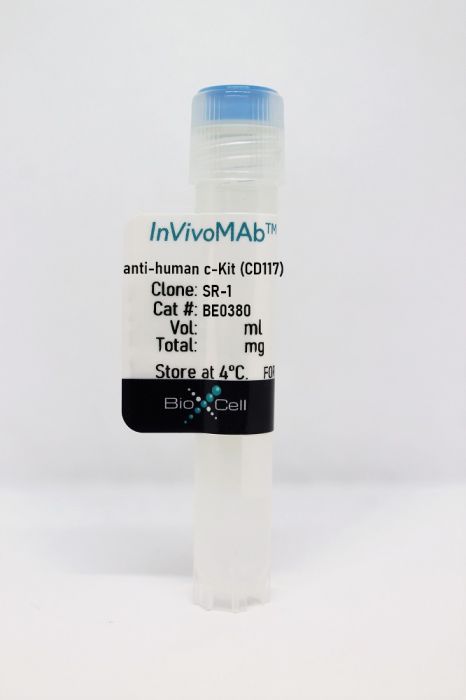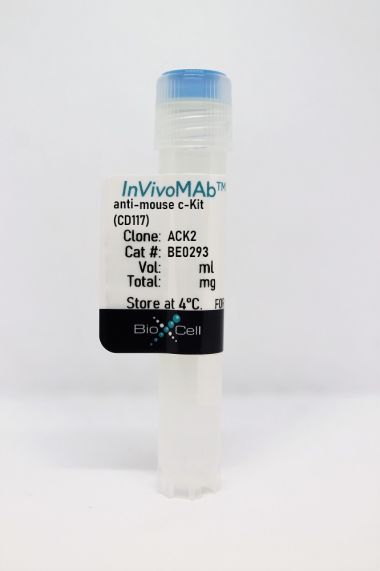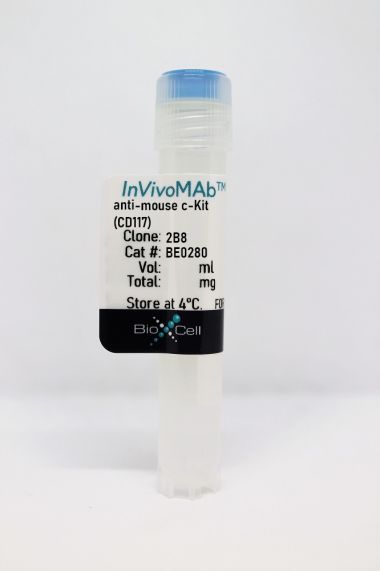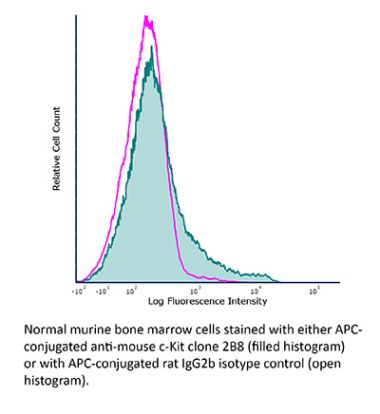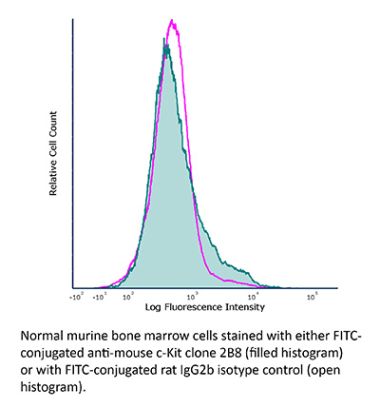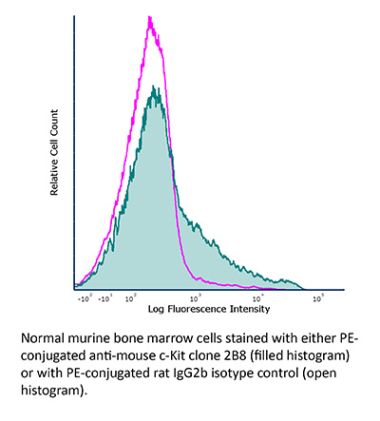InVivoMAb anti-human c-Kit (CD117)
Product Details
The SR-1 monoclonal antibody reacts with the extracellular domain of human c-Kit also known as CD117, Steel factor receptor, stem cell factor receptor, and mast cell growth factor. c-Kit is a 145 kDa transmembrane tyrosine kinase and an immunoglobulin superfamily member. c-Kit is expressed on hematopoietic progenitor cells, mast cells, and acute myeloid leukemia (AML) cells. The interaction of the c-Kit receptor and its ligand stem cell factor (SCF), promotes the proliferation and differentiation of hematopoietic progenitor cells. The SR-1 antibody has been reported to deplete c-Kit+ cells, when administered in vivo in mouse xenografts.Specifications
| Isotype | Mouse IgG2a, κ |
|---|---|
| Recommended Isotype Control(s) | InVivoMAb mouse IgG2a isotype control, unknown specificity |
| Recommended Dilution Buffer | InVivoPure pH 7.0 Dilution Buffer |
| Conjugation | This product is unconjugated. Conjugation is available via our Antibody Conjugation Services. |
| Immunogen | Human leukemic cell line OCIMl |
| Reported Applications |
in vivo c-Kit+ cell depletion in vitro c-Kit targeting Immunohistochemistry (frozen) |
| Formulation |
PBS, pH 7.0 Contains no stabilizers or preservatives |
| Endotoxin |
<2EU/mg (<0.002EU/μg) Determined by LAL gel clotting assay |
| Purity |
>95% Determined by SDS-PAGE |
| Sterility | 0.2 µm filtration |
| Purification | Protein A |
| RRID | AB_2927517 |
| Molecular Weight | 150 kDa |
| Storage | The antibody solution should be stored at the stock concentration at 4°C. Do not freeze. |
Recommended Products
in vivo c-Kit+ cell depletion, in vitro c-kit targeting
Pang, W. W., et al. (2019). "Anti-CD117 antibody depletes normal and myelodysplastic syndrome human hematopoietic stem cells in xenografted mice" Blood 133(19): 2069-2078. PubMed
The myelodysplastic syndromes (MDS) represent a group of clonal disorders that result in ineffective hematopoiesis and are associated with an increased risk of transformation into acute leukemia. MDS arises from hematopoietic stem cells (HSCs); therefore, successful elimination of MDS HSCs is an important part of any curative therapy. However, current treatment options, including allogeneic hematopoietic cell transplantation (HCT), often fail to ablate disease-initiating MDS HSCs, and thus have low curative potential and high relapse rates. Here, we demonstrate that human HSCs can be targeted and eliminated by monoclonal antibodies (mAbs) that bind cell-surface CD117 (c-Kit). We show that an anti-human CD117 mAb, SR-1, inhibits normal cord blood and bone marrow HSCs in vitro. Furthermore, SR-1 and clinical-grade humanized anti-human CD117 mAb, AMG 191, deplete normal and MDS HSCs in vivo in xenograft mouse models. Anti-CD117 mAbs also facilitate the engraftment of normal donor human HSCs in MDS xenograft mouse models, restoring normal human hematopoiesis and eradicating aggressive pathologic MDS cells. This study is the first to demonstrate that anti-human CD117 mAbs have potential as novel therapeutics to eradicate MDS HSCs and augment the curative effect of allogeneic HCT for this disease. Moreover, we establish the foundation for use of these antibody agents not only in the treatment of MDS but also for the multitude of other HSC-driven blood and immune disorders for which transplant can be disease-altering.
in vivo c-Kit+ cell depletion, in vitro c-kit targeting
Edris, B., et al. (2013). "Anti-KIT monoclonal antibody inhibits imatinib-resistant gastrointestinal stromal tumor growth" Proc Natl Acad Sci U S A 110(9): 3501-3506. PubMed
Gastrointestinal stromal tumor (GIST) is the most common sarcoma of the gastrointestinal tract and arises from the interstitial cells of Cajal. It is characterized by expression of the receptor tyrosine kinase CD117 (KIT). In 70-80% of GIST cases, oncogenic mutations in KIT are present, leading to constitutive activation of the receptor, which drives the proliferation of these tumors. Treatment of GIST with imatinib, a small-molecule tyrosine kinase inhibitor, inhibits KIT-mediated signaling and initially results in disease control in 70-85% of patients with KIT-positive GIST. However, the vast majority of patients eventually develop resistance to imatinib treatment, leading to disease progression and posing a significant challenge in the clinical management of these tumors. Here, we show that an anti-KIT monoclonal antibody (mAb), SR1, is able to slow the growth of three human GIST cell lines in vitro. Importantly, these reductions in cell growth were equivalent between imatinib-resistant and imatinib-sensitive GIST cell lines. Treatment of GIST cell lines with SR1 reduces cell-surface KIT expression, suggesting that mAb-induced KIT down-regulation may be a mechanism by which SR1 inhibits GIST growth. Furthermore, we also show that SR1 treatment enhances phagocytosis of GIST cells by macrophages, indicating that treatment with SR1 may enhance immune cell-mediated tumor clearance. Finally, using two xenotransplantation models of imatinib-sensitive and imatinib-resistant GIST, we demonstrate that SR1 is able to strongly inhibit tumor growth in vivo. These results suggest that treatment with mAbs targeting KIT may represent an alternative, or complementary, approach for treating GIST.
Immunohistochemistry (frozen)
Lammie, A., et al. (1994). "Expression of c-kit and kit ligand proteins in normal human tissues" J Histochem Cytochem 42(11): 1417-1425. PubMed
The c-kit receptor and its cognate ligand, KL, play a critical role in melanogenesis, gametogenesis, and hematopoiesis. Studies on the expression of c-kit and KL have been primarily focused on mouse development. We undertook the present study to characterize the pattern of expression of these molecules in normal adult human tissues. Using immunohistochemistry and consecutive tissue sections from the same block, we evaluated a variety of well-preserved normal tissues for c-kit and KL microanatomic distribution. c-kit protein was identified in tissue mast cells, melanocytes, glandular epithelial cells of breast, parotid, dermal sweat, and esophageal glands. Scattered c-kit immunoreactivity was also observed for testicular and ovarian interstitial cells. A striking regional distribution of c-kit was detected in the central nervous system, particularly in the cerebellum, hippocampus, and dorsal horn of the spinal cord. KL protein was identified in cells complementary to staining for the receptor, such as glandular myoepithelium of breast and sweat glands. Intense KL immunoreactivity was observed in smooth muscle cells of the bladder, cervix, uterus, and gastrointestinal tract, as well as in striated and cardiac muscle. Strong KL staining was also detected in prostate fibromuscular stroma cells. In the central nervous system, KL expression was confined to Golgi and Purkinje cells in the cerebellum. These results suggest a role for this receptor and its ligand in the maintenance of a variety of fully differentiated tissues.

